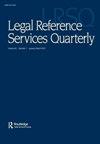From the Editor
Q4 Social Sciences
引用次数: 0
Abstract
Welcome to Legal Reference Services Quarterly. In this issue, we examine three key aspects of legal information and law library services. In A Body Without a Soul: Why Print Still Matters in Legal Research, Mari Cheney and H.J.E. Simmons offer a balanced and in-depth exploration of the significance and usefulness of using print materials in legal research education in the digital age. Critical legal information Literacy as well as epistemicide and epistemic injustice are two concepts that Nicholas Norton, a law librarian, introduced in his article Critical Collections: Bringing a Critical Eye to Law Library Collection Development. These concepts ought to be utilized by academic law libraries to evaluate information needs and build collections. It is crucial for the field of law librarianship to collaborate and partner internationally. Tian He, a law librarian, and Duncan Alford, a late law professor and librarian, discuss their experiences in developing the law library at Peking University School of Transnational Law in their article, Building a Western-Style Law Library in Shenzhen China: Peking University School of Transnational Law. Peking University School of Transnational Law is the only law school in the world that grants a dual degree in American common law (Juris Doctor) and in Chinese law (Juris Master). Last but not the least, Katharine Hanson elaborates on the benefits of slowing down utilizing Daniel Kahneman’s “System 1 and System 2” model in her article, Slow is Smooth, Smooth is Fast: How Slowing Down Can Make Us Better Researchers.来自编辑
欢迎浏览法律参考服务季刊。在这一期中,我们考察了法律信息和法律图书馆服务的三个关键方面。在《没有灵魂的身体:为什么印刷品在法律研究中仍然很重要》一书中,玛丽·切尼和H.J.E.西蒙斯对数字时代法律研究教育中使用印刷品的重要性和实用性进行了平衡而深入的探索。批判性法律信息素养与知识谋杀、知识不公是法律图书馆员尼古拉斯·诺顿在《批判性馆藏:以批判的眼光看待法律图书馆馆藏发展》一文中提出的两个概念。这些概念应该被学术法律图书馆用来评估信息需求和建立馆藏。法律图书馆领域的国际合作与合作至关重要。法律图书馆员田鹤和已故法学教授、图书馆员邓肯·阿尔福德在《中国深圳西式法律图书馆建设:北大跨国法学院》一文中讨论了北京大学跨国法学院法律图书馆建设的经验。北京大学跨国法学院是世界上唯一一所授予美国普通法(法学博士)和中国法学(法学硕士)双学位的法学院。最后但并非最不重要的是,Katharine Hanson在她的文章《慢即是顺,顺即是快:慢下来如何使我们成为更好的研究人员》中详细阐述了利用Daniel Kahneman的“系统1和系统2”模型慢下来的好处。
本文章由计算机程序翻译,如有差异,请以英文原文为准。
求助全文
约1分钟内获得全文
求助全文
来源期刊

Legal Reference Services Quarterly
Social Sciences-Law
CiteScore
0.30
自引率
0.00%
发文量
13
期刊介绍:
An important forum for daily problems and issues, Legal Reference Services Quarterly will assist you in your day-to-day work as it has been helping other law librarians and members of the legal profession for over a decade. You will find articles that are serious, humorous, critical, or simply helpful to the working librarian. Annotated subject bibliographies, overviews of legal literature, reviews of commonly used tools, and the inclusion of reference problems unique to corporate law libraries, judicial libraries, and academic collections will keep you up-to-date on the continuously expanding volume of legal materials and their use in legal research.
 求助内容:
求助内容: 应助结果提醒方式:
应助结果提醒方式:


